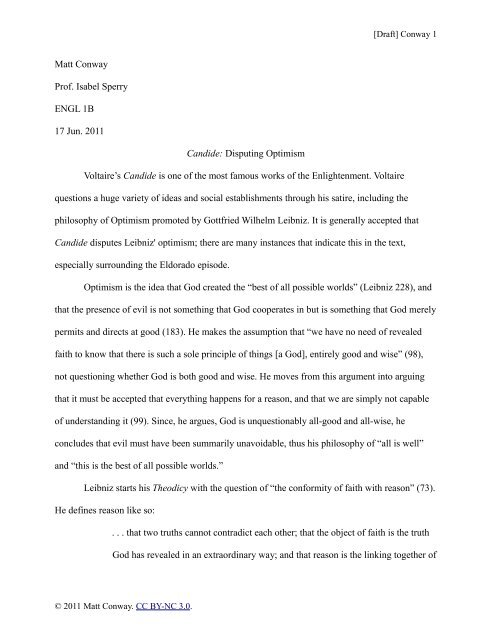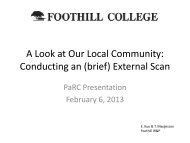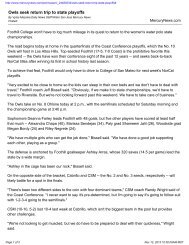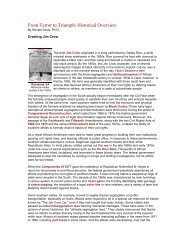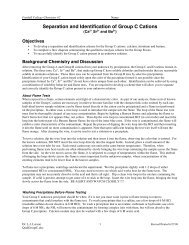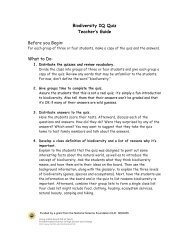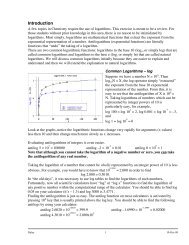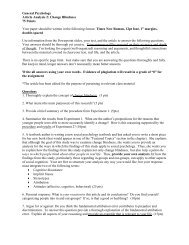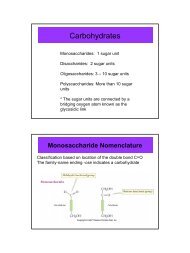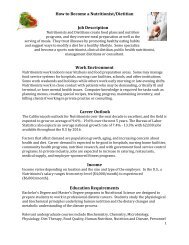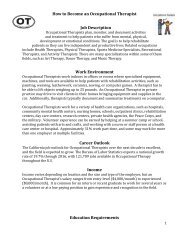Matt Conway Prof. Isabel Sperry ENGL 1B 17 Jun. 2011 Candide ...
Matt Conway Prof. Isabel Sperry ENGL 1B 17 Jun. 2011 Candide ...
Matt Conway Prof. Isabel Sperry ENGL 1B 17 Jun. 2011 Candide ...
You also want an ePaper? Increase the reach of your titles
YUMPU automatically turns print PDFs into web optimized ePapers that Google loves.
<strong>Matt</strong> <strong>Conway</strong><br />
<strong>Prof</strong>. <strong>Isabel</strong> <strong>Sperry</strong><br />
<strong>ENGL</strong> <strong>1B</strong><br />
<strong>17</strong> <strong>Jun</strong>. <strong>2011</strong><br />
<strong>Candide</strong>: Disputing Optimism<br />
Voltaire’s <strong>Candide</strong> is one of the most famous works of the Enlightenment. Voltaire<br />
[Draft] <strong>Conway</strong> 1<br />
questions a huge variety of ideas and social establishments through his satire, including the<br />
philosophy of Optimism promoted by Gottfried Wilhelm Leibniz. It is generally accepted that<br />
<strong>Candide</strong> disputes Leibniz' optimism; there are many instances that indicate this in the text,<br />
especially surrounding the Eldorado episode.<br />
Optimism is the idea that God created the “best of all possible worlds” (Leibniz 228), and<br />
that the presence of evil is not something that God cooperates in but is something that God merely<br />
permits and directs at good (183). He makes the assumption that “we have no need of revealed<br />
faith to know that there is such a sole principle of things [a God], entirely good and wise” (98),<br />
not questioning whether God is both good and wise. He moves from this argument into arguing<br />
that it must be accepted that everything happens for a reason, and that we are simply not capable<br />
of understanding it (99). Since, he argues, God is unquestionably all-good and all-wise, he<br />
concludes that evil must have been summarily unavoidable, thus his philosophy of “all is well”<br />
and “this is the best of all possible worlds.”<br />
Leibniz starts his Theodicy with the question of “the conformity of faith with reason” (73).<br />
He defines reason like so:<br />
. . . that two truths cannot contradict each other; that the object of faith is the truth<br />
God has revealed in an extraordinary way; and that reason is the linking together of<br />
© <strong>2011</strong> <strong>Matt</strong> <strong>Conway</strong>. CC BY-NC 3.0.
[Draft] <strong>Conway</strong> 2<br />
truths, but especially (when it is compared with faith) of those whereto the human<br />
mind can attain naturally without being aided by the light of faith (73).<br />
He further mentions that there are two types of truths, one being undeniable (e.g., water forms to<br />
the shape of its container), and truths that cannot be contradicted without “being led into<br />
absurdities” (74). But the issue with this argument, of course, is that the word absurd is not an<br />
objective one; an idea that is absurd to one group may well be perfectly acceptable to another. For<br />
instance, many believe that there is no higher power, but Leibniz accepts this as undeniable fact.<br />
In trying to use this reason and reconcile the truths of faith with the truths of science, he<br />
has sometimes to defer to a higher understanding and state simply that “if we were capable of<br />
understanding the universal harmony, we should see . . .” (99). Voltaire criticized him sharply for<br />
this in his short work “Well, Everything is Well,” saying “Leibniz sensed there was nothing to be<br />
said in reply [to the question of why God permits evil]; and so he made big fat books in which he<br />
confused himself” (85). Voltaire is attacking the basis of Leibniz' work here—by pointing out that<br />
Leibniz agreed that one of his primary questions is unanswerable by mortals, Voltaire is tacitly<br />
claiming his whole work is ridiculous and invalid.<br />
Pangloss appears to be an ardent believer in this philosophy of Optimism, and he uses it to<br />
explain everything. He uses it to justify much of the evil in the world, going from Leibniz’ general<br />
principles to, for instance, the notion that “the bay of Lisbon had been formed expressly for this<br />
Anabaptist to drown in” (“<strong>Candide</strong>” 9). Perhaps Pangloss is meant to directly symbolize the<br />
Leibnizian philosophy: in his youth and young adulthood, he is strong and self-confident, taking<br />
the world by storm, much as Leibnizianism did in France before the <strong>17</strong>20s (Wade 24). As his life<br />
progresses, he ends up less famous than he had hoped, as the court philosopher of a mid-rate<br />
castle in Westphalia, rather than at an upper-crust German research university, as was his wish<br />
(“<strong>Candide</strong>” 72), similar to how Optimism, once having such bright future, began to decline in<br />
© <strong>2011</strong> <strong>Matt</strong> <strong>Conway</strong>. CC BY-NC 3.0.
[Draft] <strong>Conway</strong> 3<br />
after <strong>17</strong>40 (Wade 26). Pangloss' contraction of syphilis could easily symbolize how Optimism was<br />
finally relinquished to the history books around the time of <strong>Candide</strong>'s publication (24). The fact<br />
that Pangloss did not die at the end of <strong>Candide</strong>, as Optimism died after about <strong>17</strong>60, can be simply<br />
attributed to the fact that <strong>Candide</strong> was published in <strong>17</strong>59, before the end of the reign of Optimism<br />
(many claim <strong>Candide</strong>'s well-written satire actually was the death knoll for Leibniz' Optimism,<br />
Wade 26).<br />
There are several arguments, though, that perhaps Pangloss is not, in fact, an ardent<br />
supporter of Optimism. <strong>Candide</strong> itself points this out near the end, when Pangloss admits that he<br />
no longer believes in Optimism but repeats it simply to keep from losing face (73). Arthur Scherr<br />
notes also that Pangloss was hired by the baron’s family as their philosopher; he wasn’t free to<br />
preach his own opinions necessarily. He may have been been “merely expounding the prevailing<br />
wisdom of the vicinage” (Scherr 92), not actually stating his beliefs.<br />
<strong>Candide</strong> and Cacambo's voyage to Eldorado is a central part of the story, and one that<br />
Voltaire uses to dispute optimism, in more ways than one. At first glance, it seems that the land of<br />
Eldorado flies in the face of optimism by being a better world than the one of <strong>Candide</strong> and<br />
Cacambo, contradicting the notion that “we live in the best of possible worlds.” When they leave<br />
Eldorado and see the contrast between the peaceful, pastoral land of Eldorado and the horrors of<br />
the real world, especially the abused slave they meet on the road, <strong>Candide</strong> exclaims “Oh<br />
Pangloss! . . . you had no notion of these abominations! I'm through, I must give up your<br />
optimism after all!” (“<strong>Candide</strong>” 40). The perfection of Eldorado provides a stark contrast to the<br />
horrible events of the rest of the book.<br />
But William Bottglia points out, by way of Ludwig Khan, that “a standard of perfection<br />
cannot by definition be improved beyond itself without ceasing to be a standard of perfection ”<br />
(340). This exposes an inconvenient truth about Optimism: if everything in the world is eternally<br />
© <strong>2011</strong> <strong>Matt</strong> <strong>Conway</strong>. CC BY-NC 3.0.
[Draft] <strong>Conway</strong> 4<br />
perfect, there is therefore no way to improve anything, so there is no need to even try. If Eldorado<br />
is the perfect world, it cannot be improved in any way. If the entire world is perfect, as Pangloss<br />
continually argues, there is no point in trying to fix anything about it. Voltaire often tried to bring<br />
about societal change (for instance, in his Lettres anglaises, “Voltaire” par. 9); it is likely that he<br />
found unacceptable the idea that everything is already the best it can be and that no mortal can<br />
change the course of events. Looking deeper at the situation, we see that Voltaire has not created a<br />
utopia but a dystopia 1 .<br />
But, as Shanley and Stillman point out, the idea that even Eldorado is the best possible<br />
world has serious flaws: in Eldorado, “extreme inequality exists. The first settlement that the<br />
travellers happen upon is, as the host of the inn allows, 'a poor village'” (Shanley, Stillman par.<br />
3). Although the children are clothed in gold, they point out, gold is completely worthless in the<br />
country; their clothes are made of “mud” (Ibid.). They point out how many servants there are in<br />
the land of Eldorado (par. 4); obviously, this is a utopia seen from the standpoint of the upper-<br />
class (footnote 5).<br />
Eldorado is a materialistic society. While they do not concern themselves with the normal<br />
trappings of wealth—their so-called “yellow mud”—Shanley and Stillman give a laundry list of<br />
material excesses, from the food (“600 hummingbirds on a platter,” par. 15) to the architecture (a<br />
220 foot high doorway, par. 25).<br />
The mental capacity of those in Eldorado is also constrained. They are obviously not free<br />
to leave, and Shanley and Stillman point out that there is almost no individualism. None of the<br />
characters in Eldorado are even given names (par. 9)! Voltaire also never mentions any sort of<br />
love or relationships between Eldoradans, a central theme elsewhere in the book (par. 8).<br />
1 In this paper, the word dystopia is assumed to mean “something that appears to be a utopia, but is in actuality very<br />
far from being a utopia, perhaps even so far as to be singularly undesireable.”<br />
© <strong>2011</strong> <strong>Matt</strong> <strong>Conway</strong>. CC BY-NC 3.0.
[Draft] <strong>Conway</strong> 5<br />
Perhaps all of this is intended to demonstrate to us that there is no objective way of<br />
defining what the 'best possible world' is, which renders the entire philosophy of Optimism null<br />
and void—if there isn't a single 'best' world, we can't be in the best world because what is best for<br />
one may not be best for another. Do we give up mental freedom for peace, intellectual stimulation<br />
for the protection of an benevolent king? Or is it best to be free at the expense of some security<br />
(as Benjamin Franklin would argue)? As long as these questions of what is the best world remain<br />
unresolved and unresolvable, there is no way Optimism can apply to the entire world.<br />
J. G. Weightman argues that Eldorado represents an attack on God by showing what the<br />
world would be like without the stress of natural disasters and human-made evil. He asks “how<br />
would the people of Eldorado retain their serenity if their capital were shattered by an<br />
earthquake?” (166). This is an interesting point, and certainly holds water, but Weightman does<br />
not mention the other aspects of Eldorado that make it possibly less desirable than other worlds.<br />
Donna Isaacs Dalnekoff argues that Eldorado is not the only imperfect utopia in <strong>Candide</strong>,<br />
although it is the most prominent. She argues that most all of the places <strong>Candide</strong> visits before his<br />
return from Eldorado are imperfect utopias (Dalnekoff par. 9), or perhaps dystopias. The castle at<br />
Thunder-Ten-Tronckh is seem as a utopia by <strong>Candide</strong>, as is Holland (where he meets the<br />
Anabaptist, but also is harshly punished for refusing to state that the Pope is the Antichrist, par. 9).<br />
Even Lisbon is seen through Utopian eyes, she claims, once Pangloss asserts that all that has<br />
happened has happened for the best (par. 10). Perhaps Eldorado is meant to top off the list of<br />
possible best worlds, leaving the reader looking at the real world and saying, as <strong>Candide</strong> does, “I<br />
must give up . . . optimism after all!” (“<strong>Candide</strong>” 40). It is clear that these worlds are not in fact<br />
utopias, but <strong>Candide</strong> tries to see them as such, and, until he leaves Eldorado and realizes how bad<br />
things are, he is mostly successful in believing that he lives in the best possible world, in a utopia<br />
(or as close as humans will ever get to one).<br />
© <strong>2011</strong> <strong>Matt</strong> <strong>Conway</strong>. CC BY-NC 3.0.
[Draft] <strong>Conway</strong> 6<br />
Kurt Vonnegut examined the idea of imperfect utopias and the “best possible world” in his<br />
short work “Harrison Bergeron.” In that work, everyone in the world has been made equal “every<br />
which way” (7). In that world, “handicaps” prevent stronger, smarter or prettier people from<br />
taking “unfair advantage” (7) of their abilities. The parallel to <strong>Candide</strong>, by way of Dalnekoff’s<br />
argument presented above, is that the people in this world (or most of them, anyhow) truly believe<br />
this is the best possible world, even when it has obvious flaws, like newscasters being unable to<br />
read their copy due to induced “handicaps” to make them all equal, or ballerinas who can’t dance<br />
because of the weights padlocked to them to prevent them from being unfairly graceful, or smart<br />
people being forced to wear earphones that distract them every few moments, so that they cannot<br />
think more deeply than others. Even when he was forced to join the Bulgar army, for instance,<br />
<strong>Candide</strong> still felt that he was in the best possible world, just as the characters in “Harrison<br />
Bergeron” don’t want to go back to the “dark ages” (9), even if, through the eyes of an outside<br />
observer, the situation clearly seems to be non-optimal.<br />
The ending of the work gives us a “so what” view of the heavy philosophizing that has<br />
occurred so far. When Pangloss' attempts to state that all is for the best because, if the horrid<br />
events that occupied much of the book had not happened, they would not have all ended up<br />
together on the farm (“<strong>Candide</strong>” 75), <strong>Candide</strong> neither agrees nor argues with him, he simply says<br />
“That is very well put, . . . but we must cultivate our garden.” Voltaire is pointing out that there is<br />
more, much more, to life than philosophy, and indeed saying that philosophy is not needed or<br />
even desirable, necessarily, to lead a good life. He has spent the entire book arguing with Leibniz,<br />
now he is taking a different tack and arguing that it doesn't really matter whether you subscribe to<br />
the philosophy of Leibniz, or Newton, or Spinoza, as long as you try to make your life the best it<br />
can be and try to improve the lives of those around you.<br />
© <strong>2011</strong> <strong>Matt</strong> <strong>Conway</strong>. CC BY-NC 3.0.
Works Cited<br />
[Draft] <strong>Conway</strong> 7<br />
Bottiglia, William. “The Eldorado Episode in <strong>Candide</strong>.” PMLA Vol. 73, No. 4 (Sep., 1958): 339-347.<br />
Modern Language Association: 1958. JSTOR. Web. 10 <strong>Jun</strong>. <strong>2011</strong>.<br />
Dalnekoff, Donna Isaacs. "The Meaning of Eldorado: Utopia and Satire in <strong>Candide</strong>." Studies on<br />
Voltaire and the Eighteenth Century 127 (1974): 41-59. Rpt. in Short Story Criticism 112.<br />
Detroit: Gale, 2008. Literature Resource Center. Web. 10 <strong>Jun</strong>e <strong>2011</strong>.<br />
Leibniz, Gottfried Wilhelm. Theodicy. Trans. E. M. Huggard. Project Gutenberg. Web. 6 <strong>Jun</strong>. <strong>2011</strong>.<br />
<br />
Scherr, Arthur. “<strong>Candide</strong>’s Pangloss: Voltaire’s Tragicomic Hero.” Romance Notes 47.1 (Fall 2006):<br />
87-96. University of North Carolina: 2006. Literary Reference Center. Web. 7 <strong>Jun</strong>. <strong>2011</strong>.<br />
Shanley, Mary L., and Peter G. Stillman. "The Eldorado Episode in Voltaire's <strong>Candide</strong>." Eighteenth<br />
Century Life 6.2-3 (Jan.-May 1981): 79-92. Rpt. in Short Story Criticism 112. Detroit: Gale,<br />
2008. Literature Resource Center. Web. 10 <strong>Jun</strong>e <strong>2011</strong>.<br />
"Voltaire." Encyclopedia of World Biography. Detroit: Gale, 1998. Gale Biography In Context. Web.<br />
10 <strong>Jun</strong>e <strong>2011</strong>.<br />
Voltaire. <strong>Candide</strong>, or Optimism: a Fresh Translation, Backgrounds, Criticism. Trans. Robert M.<br />
Adams. 2nd ed. New York: W. W. Norton, 1991.<br />
Voltaire. “Well, Everything is Well.” <strong>Candide</strong>, or Optimism: a Fresh Translation, Backgrounds,<br />
Criticism: 84-89. Trans. Robert M. Adams. 2nd ed. New York: W. W. Norton, 1991.<br />
Vonnegut, Kurt Jr. “Harrison Bergeron.” Welcome to the Monkey House. New York: Delta/Dell, 1968.<br />
Wade, Ira O. Voltaire and <strong>Candide</strong>. Princeton, NJ: Princeton University Press, 1959.<br />
Weightman, J. G. “The Quality of <strong>Candide</strong>.” <strong>Candide</strong>, or Optimism: a Fresh Translation,<br />
Backgrounds, Criticism: 153-167. Trans. Robert M. Adams. 2nd ed. New York:<br />
W. W. Norton, 1991.<br />
© <strong>2011</strong> <strong>Matt</strong> <strong>Conway</strong>. CC BY-NC 3.0.


